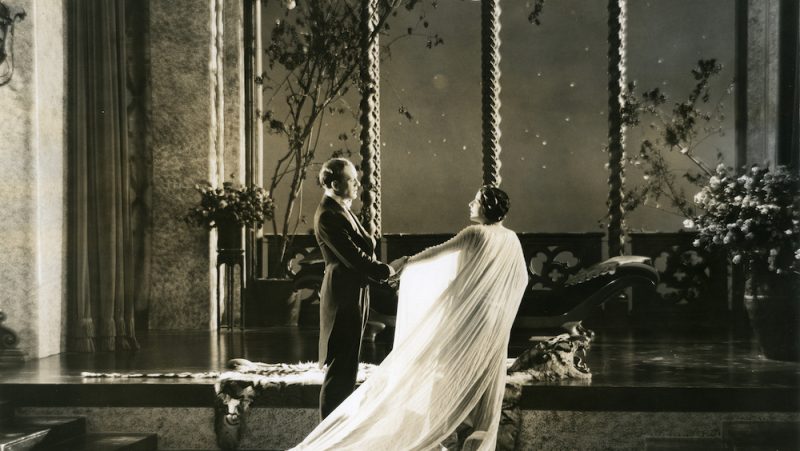The festival spotlight on Friday 7 October is on the Ruritania retrospective, which has already screened many films, and will be continued in next year’s edition of the Giornate. Today’s programme intertwines fiction and historical documents. Our main fiction feature is Three Weeks (1924), directed by Alan Crosland. The film was never released in Italy, and the only known existing copy, with English flash titles, was at Gosfilmofond in Moscow. In 2020 the Cineteca del Friuli offered to reconstruct the film based on an original continuity script at the M-G-M collection at the University of Southern California, and in the summer of 2021 4K DPX files were sent to Italy from Russia. The film was finally ready in time for this year’s festival. Scandal swirled around the property from the start, beginning with the publication of Elinor Glyn’s erotic romantic novel in 1907, and it continued when this film version hit cinema screens in 1924. Branded obscene in conservative circles for its open depiction of female sexual desire, the novel was translated into many languages, including Italian, enjoying great success everywhere. The protagonist of Three Weeks is the queen of a Balkan country who is dissatisfied with her marriage, and seeks and conummates a relationship with a younger man. Yesterday and today, passion and a power struggle are always a winning combination. At the time of the film’s release memories of the assassination of King Aleksandar I of Serbia and his consort, Queen Draga, were still vivid, and can be discerned in the script’s treatment of the commonly held view of Slavic nature as passionate and violent. The film of Three Weeks features scenes of bloody hordes of rioters attacking the palace of the debauched king, which are not in the novel. Contrary to what we see on screen, there was also no love between its stars, Aileen Pringle (the Queen) and Conrad Nagel (her lover Paul Verdayne). Their acting nevertheless evokes the hothouse atmosphere of torrid passion, but it is above all the photography and the exceptional set design by Cedric Gibbons that still arouse unanimous admiration today.
A completely different Ruritania is seen in the supporting short, the comedy His Royal Slyness (1920), directed by Hal Roach and starring Harold Lloyd, always a guarantee of quality. The subjects of these operetta kingdoms provided ample opportunity for satire, and here it is applied with a free hand. Variety’s review called the film “by far the best comedy that has ever been put out with Lloyd, and it evoked genuine laughter, the kind that comes from within and is unrestrained”.
The Norma Talmadge retrospective’s programme at 10.45 features Within the Law (1923) by Frank Lloyd, in which the actress plays two different roles, not of two different people, but a woman whose personality changes when she is unjustly imprisoned, and is radically transformed by the experience. The film’s screenwriter is Frances Marion, the prolific author of around a hundred screenplays, who won Oscars in 1930 and 1932. She was also a war correspondent, writer, and director. The programme on Friday 7 October, at 14.00 in the Teatro Verdi, pays tribute to Marion with the screening of the second of the two films that she directed, Just Around the Corner (1921). The film tells of the efforts of a poor, sick widow who struggles to ensure that her two children have an honest life; the story is treated conventionally and moralistically, which is a bit strange considering that in private life the director, and Fannie Hurst, the author of the original story, were both well known as fierce feminists.
Don’t forget the Canon Revisited section, which at 16.30 features Manolescu (1929) by Viktor Tourjansky, the first big production that this director from Ukraine made in Germany, after having been Gance’s assistant director on Napoléon. Inspired by the story of a Romanian fraudster that was much covered in the Berlin press at the turn of the last century, the film’s starry cast includes such greats as Ivan Mosjoukine, Brigitte Helm, Heinrich George, and Dita Parlo, with a celebrated director of photography, Carl Hoffmann, who worked on big Ufa productions by Lang and Murnau.
To open the evening, at 21.00 in the Teatro Verdi, is the ceremony presenting the Giornate’s prestigious accolade, the Jean Mitry Award, which since 1986 has been given to personalities and institutions that have distinguished themselves in the recovery and valorization of the heritage of silent cinema.
The online festival programme continues on MYmovies at 21.00, with Manolescu (1929), directed by Viktor Tourjansky, starring Ivan Mosjoukine and Brigitte Helm.
The Giornate del Cinema Muto festival is realized thanks to the support of the Regione Autonoma Friuli Venezia Giulia, the Ministero della Cultura – Direzione Generale Cinema, the Comune di Pordenone, the Pordenone-Udine Chamber of Commerce, and the Fondazione Friuli.


 Italiano
Italiano
Recent Comments